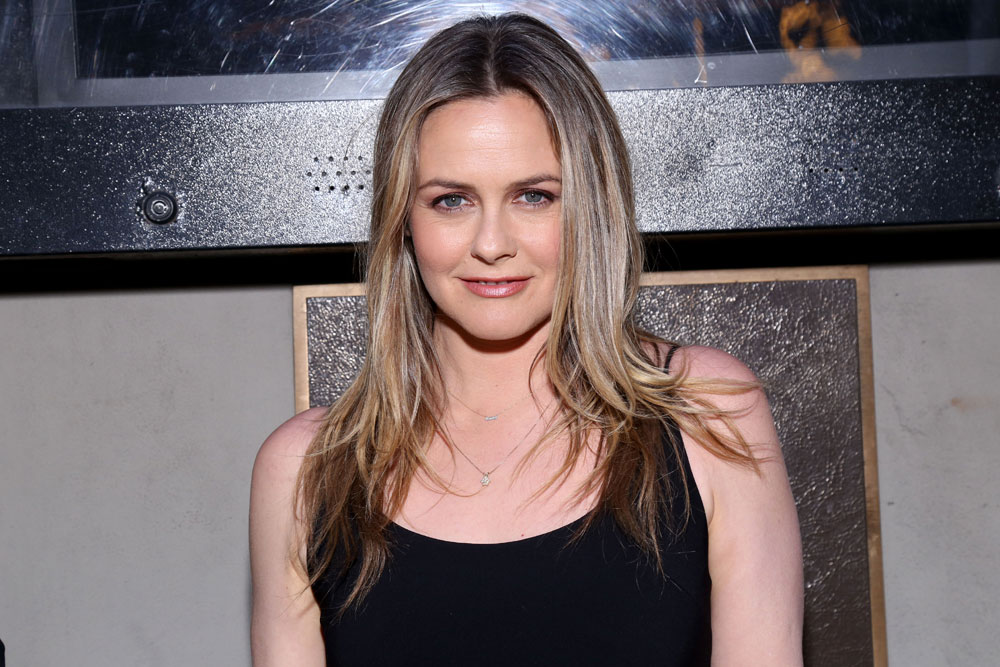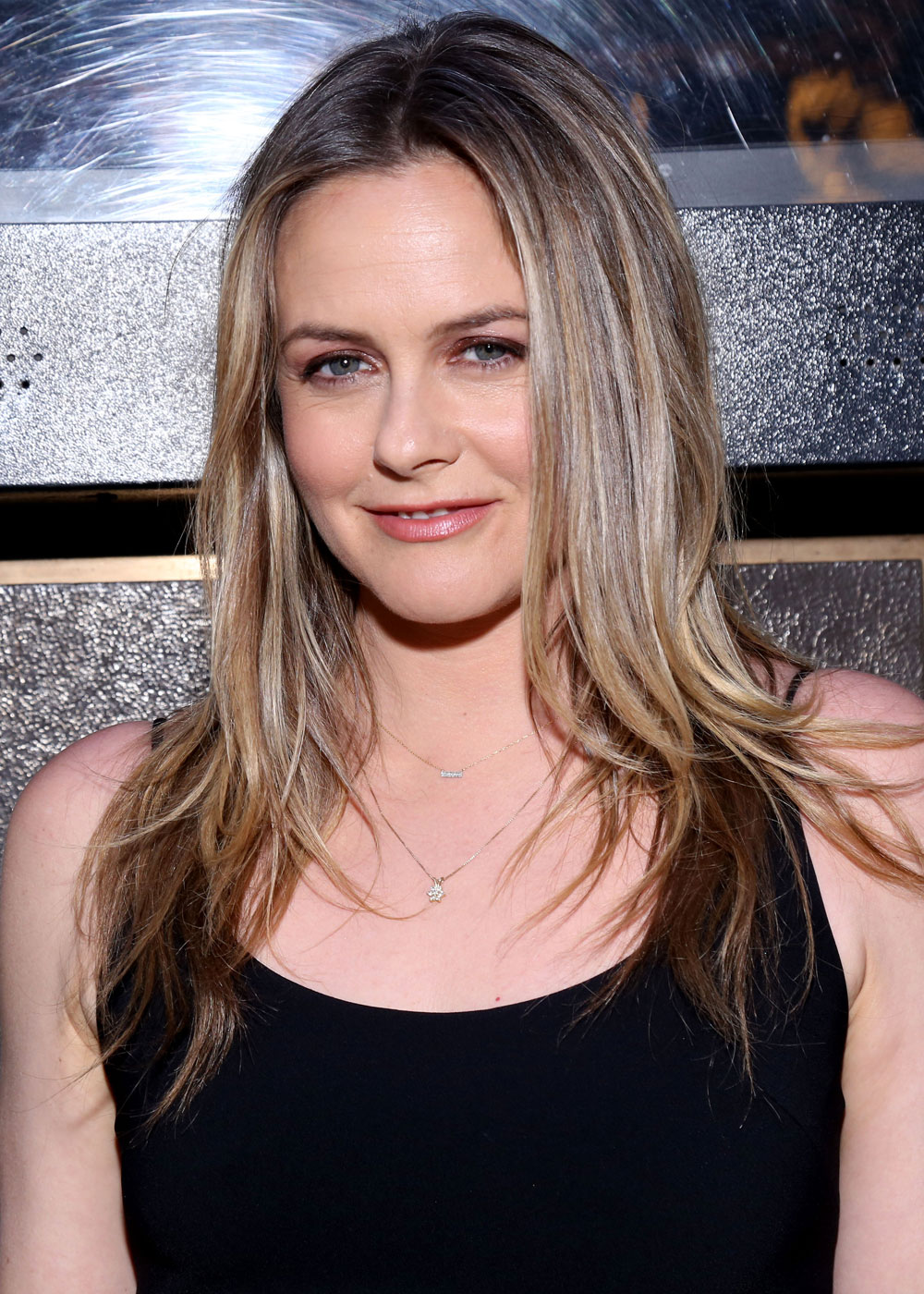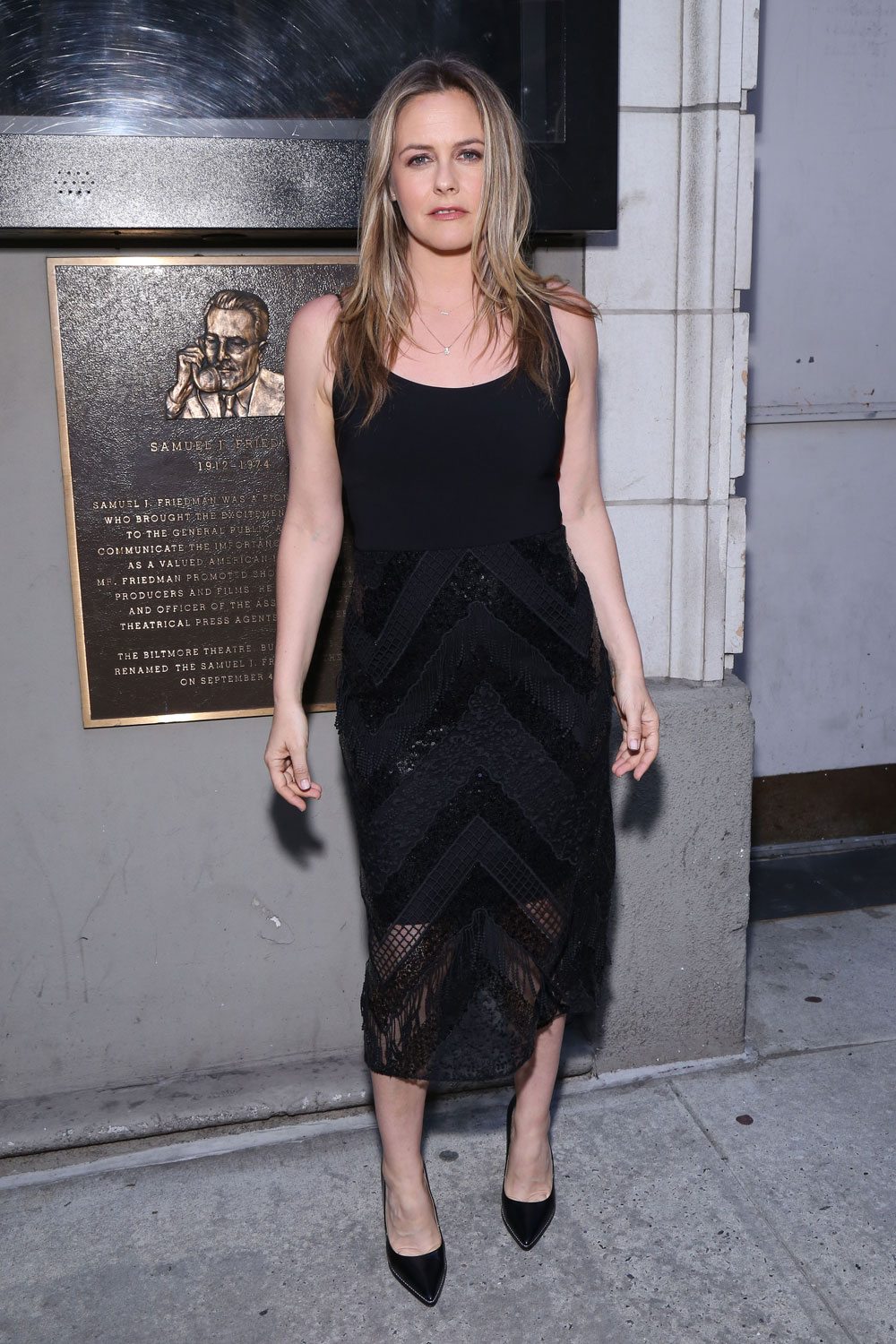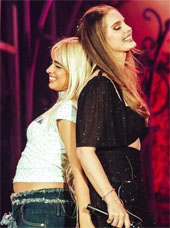
This story came out a few days ago but I wanted to talk about it. Alicia Silverstone is committed to veganism and to living a lifestyle that has a low impact on the environment. In May, I reported on a video where she gives a tour of her kitchen. Alicia never uses paper towels, she reuses old jars for storage, and on the rare occasions she uses plastic bags she washes and reuses them. That post was surprisingly popular as so many of you are similarly committed to reducing your waste and living sustainably. Last week Alicia tweeted about a recent experience she had at Starbucks where she was charged more for plant-based milk and where a barista used a disposable cup just to transfer the milk to Alicia’s reusable cup. Starbucks has responded that they’re looking into it.
Here’s what Alicia tweeted and I’ve included Starbucks’ response below.
Depressing! Just brought my reusable mug to @Starbucks &saw staff use a disposable cup, pour it into my mug, then toss the disposable cup. Totally defeats the purpose of trying 2 reduce waste. Then I looked around to see so many people sitting @ the cafe all w disposables! Ugh.
— Alicia Silverstone (@AliciaSilv) September 10, 2019
Also!I'm always frustrated by extra charges for non-dairy milk. Y should we be penalized 4 making the eco-choice? It would be amazing for @Starbucks to lead the way &consider enviro externalities associated w the dairy industry by having dairy cost + or at least = plantmilk fees.
— Alicia Silverstone (@AliciaSilv) September 10, 2019
Starbucks baristas are encouraged to craft beverages directly in customers’ reusable cups whenever possible. Building on our long standing commitment to sustainability and an elevated customer experience, we will take this opportunity to review guidance to our partners about personal cup use as we continue to be mindful of waste.
Regarding alternative milks, adding a splash of any alternative milk to brewed or iced coffee, cold brew or an Americano is always offered free of charge. The price of our beverages is based on a standard recipe, so any customizations that are not part of the standard recipe, which could include added flavors, alternative milk, or an additional shot of espresso, will incur a small surcharge.
As wasteful as it sounds, I sort-of understand why baristas use disposable cups to transfer milk. It probably helps them measure better than pouring directly and if they used a reusable cup they’d have to wash it out. That doesn’t make it right, but I can see where they’re going for convenience and trying to save time. There may be some kind of hack for that which will work with the existing system, Starbucks would just need to have someone observe in their shops for a few days to figure it out.
There aren’t any Starbucks in my town and I rarely go to the local coffee shop because I work from home. Sometimes I get coffee from Sheetz (a chain gas station) and I use a reusable Sheetz coffee cup because it’s less wasteful and also cheaper. That’s the real motivator for me. Sheetz has a creamer dispenser which lets you choose a flavor and press a button so it dispenses a serving into your cup. Maybe Starbucks could use something similar with their non-milks. It makes sense that the more expensive milk alternatives cost more if they’re used in larger quantities.
I take almond milk in my coffee because it’s more readily available than other milk alternatives and you can get it at the convenience store near my house. (I’m not a fan of real milk except in ice cream.) In Alicia’s twitter thread there’s a discussion about how much water almond milk takes to produce. I’ve heard this before but haven’t paid that much attention to it, sorry! I’ve been meaning to try cashew milk as I’ve heard it both tastes better than almond milk and uses less resources. So after reporting on this story I’m going to try cashew milk!
Here’s Alicia showing off her fridge. This isn’t the video I reported on earlier this year. She loves showing her kitchen and fridge!
photos credit: WENN and via Instagram













Oh I love and miss Sheetz!
Also, I thought that dairy alternatives have just as much as an environmental impact due to the process involved in making it. I wouldn’t really consider it an eco-choice.
That’s not true for all dairy alternatives though it’s definitely true for almonds. And even that doesn’t come close to the environmental impact of cows and dairy industry.
Exactly. Not to mention the cruelty of milk production in industrialized farming (nursing calves are taken from their mothers and slaughtered so that we can drink cow’s milk). The cows are pumped full of hormones and hooked up to machines for their whole lives. They are artificially inseminated. After we use them for milk machines, they are slaughtered while still young. It’s actually disgusting and unhealthy.
Not even true for almonds! According to my in-depth research (i.e. I just Googled it as I wasn’t sure myself), cow milk requires SIX times the amount of water as almond milk for a gallon and has more than double the carbon footprint.
I should have said that I know they are better than cows milk but still not the most eco friendly thing out there. I believe that count milk it the most eco friendly and do like the yogurts that they have made with that.
We only drink organic pasture raised milk and probably only a half gallon a week. We just don’t like the floor of the alternatives. We have a dairy farm down the road and when I realized they never leave the barn was when we made the switch to pasture raised.
Calling plant “milks” milk has always felt weird to me, just because the process has absolutely nothing to do with milk. Just something maybe lots of people in other parts of the country haven’t thought of before: Here in Wisconsin we’re losing two dairy farms a day. Our farmer suicide rate has skyrocketed. And the trade war tariffs have seriously hurt them on top of that. It’s so sad, and we see it every. single. day. It is a CRISIS here. I know they’ve introduced bills to change how we label plant-based drinks (like that will suddenly give farmers a boost 😂). I have a kidney disorder and lost a bunch of weight because of it in high school. My parents switched me to whole milk and 10 years later, after my body has changed, I just can’t go back. And now that I’ve spent years in Wisconsin I try to buy local to support our dairy farmers.
No idea why I’m rambling. Thanks for reading my dumb thoughts on plant-based drinks 😂 if you like and can drink real milk, please support your local farmers. They’re probably struggling big time.
Also now I’m craving some vanilla soymilk in cereal 😆
P.s. I know dairy milk has a FAR worse impact on the environment. So many farmers want to become more sustainable, but they can’t afford to buy new equipment, implement new policies, or hire eco-consultants when they’re struggling to stay alive, financially and literally. We also need more young people going to college for agricultural sciences so they can help these family farms be more efficient and more sustainable.
And this has been your Wisconsin Watch in the Celebitchy comments 😂
It’s hard for me to feel sorry for an industry that has thrived on the rape of female cows, stealing their newborns, hooking them up to machines until their bodies run dry, and then sending them to slaughter. An industry whose powerful lobby has made sure the public thinks huge amounts of dairy is not only normal but healthy to the detriment to our health, our planet’s health and to the well-being of animals. I’m glad diary is in decline.
@SAVU:
I understand where you’re coming from. I grew up in the dairy belt in MN & my family worked very hard to not be nothing like the inhumane farms that keep popping up.
When people leave comments here about “raping” cows I think of my sweet, gentle grandpa. You never met someone who loved his cows so much. Who had a running list posted of each cow by name & what their diet was, including measurements. Not a one-size-fits-all kind of farm. He sang to his cows every night after milking them, curry combing them from head to tail, while looking over their skin, udders & tails to make sure each one was healthy. They mooed in delight when they caught sight of him in the barn, out in the pasture, etc.
That’s the kind of farmers I grew up with.
Anyone who says cows are “raped” has never actually seen AI done in person. Cows usually keep munching out of the feed bunk while it happens. I have seen it with my own eyes. Cows don’t have romantic feelings about mating. Cows don’t talk about the bulls and which 1,500 pound mate they’d like to jump on their backs with hooves and horns driving. There is no 50 Shades of Grey enjoyment for the cow from natural mating, though there is potential pain.
@DEEDEE:
Thank you!
Calling it rape is so disrespectful to people who have actually been raped.
@Annika, well I am survivor of sexual assault, and I have been on dairy farms and have seen what happens to cows so please don’t say I have no idea what I am talking about. I do, and I chose that word carefully. I have also rescued those newborns that are ripped away from their moms and sent to become veal, as well as the moms who are shipped to slaughter when they can no longer produce enough milk for their farmer.
Forcibly impregnating an animal so you can steal her milk and her baby is reprehensible.
@ORIGINALLALA:
I am a survivor of sexual abuse. I am personally offended by the manner in which you used the word.
Surely you recognize lots of CB readers here have also survived sexual trauma & the need for sensitivity here?
I’ve ignored your baiting & name calling today, & now I politely request that you stop engaging with me here, as well as in any future posts on CB. I have no desire to converse with you. At all.
You can hate me for not being vegan, it’s fine.
I think those who disagree with @OriginalLala just have an attachment and conviction to continue drinking cow’s milk. It really is inhumane what goes into industrial milk production, and we desperately need to find industrial-scale solutions to transitioning these farmers from producing milk and meat to other produce, not only for humane reasons, but also for our survival. This isn’t sustainable.
@DERRIERRE:
Nope, not at all.
My problem with Originallala is her use of the word rape.
I think it’s insensitive & I’m offended by it.
I don’t have a problem with her/him being vegan or anyone else.
Please go back & read through the comments & you’ll see my point.
As another Wisconsin resident, it’s a bit of a stretch to blame plant and nut milk alternatives for the ongoing decline in small scale dairy farms in Wisconsin and the Midwest. It’s a trend that has been ongoing for over 25 years, primarily due to more large scale corporate dairy operations and declining milk prices, although that isn’t reflected in what you pay at the grocery store. As someone who drinks almond milk for health reasons, it’s actually cheaper than dairy milk.
My dad grew up on a dairy farm, one of 7 kids. He was the only one of his 3 brothers who didn’t go into farming and got a college degree because he hated having to get up in the morning before school to go out to milk the cows. All but one of his siblings had to do that with their parents, and the one sister that didn’t was responsible for making breakfasts and lunches for the rest of them. The process had to be repeated in the evening. Even 40+ years ago, that made for a long day for my dad and his siblings with school and after school activities. The only reason my grandparents were able to make a living farming was because they had cheap labor with 7 kids and they were active before the big corporate farms started coming in, when small “family” farms could make with government subsidies.
The two brothers that did farm as a career both got out of it starting in the mid 90s. The first to get out of both dairy and agricultural farming got out in time to find a second career with a retirement plan and worked for over 20 years before retiring recently. The land and house had been in my aunt’s family for over a hundred years now. Him and his wife still own large amounts of agricultural land that they rent out. He raised some specialty heirloom cattle for beef for a while, and I’m not still sure how he could treat animals that he firmly intended for meat as pets. I know they’ve gotten offers from developers for their land, both for residential development and for other things, including cell towers. Because they rent their land out, it’s taxed as agricultural use land, a lower rate than residential use. A decent portion of it is also not farmed and set aside for conservation purposes, including wetland renewal because they like watching the migrating birds come. My cousin is likely to inherit both the house and land, and I’m not sure what he’ll do with it, given that he already has a house and no interest in farming.
The other one inherited the family farm, and scaled back around 2010 due to his first heart attack. He still does some planting, but got out of the dairy business after the heart attack. My dad and him are distant, but my dad suspected that his brother had been losing money dairy farming for some time before he got out from talking to one of his sisters.
Man, I always am impressed with how freaking resilient farm-raised kids are. The amount of work involved is just mind-boggling. And I don’t blame people for getting out of farming. There’s some great small-scale farms out there – I was a 4-H kid and showed Holsteins. And that was a lot of work. But I didn’t grow up on a farm – so it was only a tiiiiny fraction of the amount of work that farm kids would have to do. My best friend was one of three sisters who grew up on a dairy farm. They were some of the toughest girls I’ve ever met in my life – and smart as a whip. The oldest is now a doctor, my friend is an RN, and the youngest I believe is working in vet sciences. But none of them had big ambitions of taking over the farm. I do believe that the youngest may be dating someone who’s in the industry though, so I could see that working out well for their dad in the long run.
“As wasteful as it sounds, I sort-of understand why baristas use disposable cups to transfer milk. It probably helps them measure better than pouring directly and if they used a reusable cup they’d have to wash it out. ”
Plus the allergy aspect. If someone is allergic to something, disposable cups is probably offering a bit more protection to the people that need that.
I used to be a barista and a coffee shop manager. There are designated steaming pitchers for each type of milk. So there should never be an issue They could have simply used the one they have for dairy alternatives instead of a disposable cup. The issue is that most people still dont think in terms if not being wasteful and sustainability. The barista grabbed a cup because it was there.
I agree in theory, but I’ve literally watched baristas make multiple non dairy drinks in dairy containers before. I finally said something the second or third I saw it and pointed out that if I had an allergy rather than an intolerance to dairy they could potentially kill me. Food industry needs to make it clearer to people that non dairy isn’t a calorie choice for a hefty portion of the population. (And nut and soy allergy are hardly uncommon, either.) It’s frustrating because the system could work if people were better informed or less lazy, but at this point, I almost never visit cafes for this reason and have to watch them like a hawk when they make orders.
@Veronica S hence why I said “should”. Starbucks does a LOT of things that are wrong based on what i know and how I was trained. They are the fast food equivalent of a coffee shop. Most of their baristas have no idea how to make a proper latte or how to even steam milk properly. I occasionally go to Starbucks because it’s convenient- they are everywhere – but quality control isn’t their strong suit.
Why aren’t they pouring directly from the steamer into the cup? They should have a different steamer for every type of “milk” for this exact reason.
They do/should
It sounds like a local health code rule.
She probably doesn’t realize it’s a health code violation to use her mug from home due to cross contamination. I get what she’s trying to do but Starbucks is literally following the law.
This.
I don’t understand. I order a milk based coffee they warm the milk in a jug that they then pour directly into my own cup. What is this violating?
And when they rest the spout of their pitcher on the lip of your God knows where it’s been disposable cup?
DS9 you completely lost me. I’m not using a disposable cup that’s my point.
Unless the law has changed this was never an issue when I was a barista. The milk is steaming in a steaming pitcher and poured directly into the reusable mug. Same for espresso shot which are pulled into espresso cups. You aren’t using the person’s reusable mug for anything. So I don’t get what the issue would be.
This, and it probably changes from one city or state to another.
Not necessarily. Some health codes absolutely allow for home-brought dishes and employees are happy to help.
Others do, but the restaurant employees aren’t trained to handle home-brought dishes.
At least where I live it isn’t an issue to use your own cup and it hasn’t been when I travel. The baristas just ask that YOU remove the lid before handing it to them and put it back on both to not lose it and because it reduces possibility of transfer.
I’ve never worked for Starbucks but I waited tables for a long stretch in various restaurants. We were not supposed to bring outside dishes or cups into the kitchen for any purpose.
Whether that was health code, company standard, e.t.c, I couldn’t say but it is an attempt to err on the side of caution.
We only broke the rule when it came to feeding a baby. Even then we were encouraged to take a pitcher of hot water to the table to heat a bottle instead of bringing it into the kitchen.
I use Oat Milk! I used to use Almond milk but I have developed an intolerance to it – which can happen apparently.
I used to manage a coffee shop and was a barista. They could have used a steaming pitcher to pour her milk. It didn’t have to be a disposable cup.
I just started using oat milk about a month ago! 🙂
I gave up cow milk in my coffee about 2 and half months ago and started experimenting withe almond milk and coconut milk and i have to say Oat milk is the way to go!
I tried an oat milk capuccino for the first time on Friday–it was totally delish! I also love Ripple pea milk. And organic soy milk. All unsweetened.
Came down to the comments literally to see if anyone else was suggesting oat milk. I concur that it’s excellent. It also generally works well in recipes if you’re using a dairy substitute instead of milk. I think the consistency of it is more similar to milk than other substitutes
YES!! as one of the 60% of people who are lactose intolerant, wtf do I pay more for lactose free or dairy alternatives and why isn’t it offered at all locations? I’m just asking for the convenience of lactose free, not anything special. My dairy rage is just seething and it’s about time we talked about this… As soon as my kids are gone my house is a dairy free zone anyways.
Exactly. It sucks to be penalized for something I can’t control. Part of me tries to rationalize it by thinking of it as an earth tax or something, but it does bum me out to be charged more because of an “illness” I can’t help. I’ll take any dairy alternative, soy, coconut, almond, whatever. Hopefully someday this will change.
I’m honestly surprised Starbucks doesn’t get more flack for their huge waste production especially because as a corporation they try to seem so responsible.
So many plastic cups and lids daily that go right into the trash, they don’t even have recycling in their stores. At least not in New York City. I find it hard to believe they can’t put separate trash cans in their store where you can recycle the plastic cups and lids at LEAST.
Wait, for real?! I’m in Wisconsin and I don’t think I’ve ever been to a Starbucks that DOESN’T have recycling along with the garbage can.
NJ here and they definitely have separate recycling in all of our Starbucks. I’m surprised NYC would not be similar.
The salad chain Chopt is the worst! All plastic and no recycling.
I am in NYC and see recycling bins in Starbucks all the time. That said, the NYC street trash cans say to comingle trash and recycling and the city will sort through everything on the back end, so it might be the same for trash from businesses.
Long island Starbucks have recycling.
This really bugs me. I also try to reduce my personal waste footprint. I see nothing wrong with calling out corporations for their practices as well. But saying she deserves the same price for a substitute ingredient is dumb. A. Those “milks” are not eco-friendly. B. You don’t go to a steakhouse and ask for filet at the hamburger price.
On point A: They’re all far more eco-friendly than cow milk. Even almond milk, with all the water needed to grow the almonds.
On point B: The only reason people would choose a filet over a hamburger is for the taste/quality. The 99.9% of people choosing non-dairy milk over cow milk don’t do it for those reasons – it’s either environmental impact or allergies. So yes, you should be able to get both at the “hamburger price”.
And who should absorb the cost? Any customization to a standard recipe at most Starbucks and other cafes incurs a cost.
They are better than cow dairy. And as someone who is lactose intolerant and cannot have dairy products, it’s a bummer to be charged for it. I’d like to say I’m more eco friendly, but I firstly choose it because otherwise it feels like someone is stabbing me in my stomach.
Dairy’s only cheap because it’s heavily subsidised, out of your taxpayer dollars.
I agree that milk is sort of a weird term to use for dairy alternatives. (It conjures weird images: imaging milking an almond…) All dairy alternatives impact the environment in terms of water and land use; however, I think they still end up being more environmentally friendly than cow’s milk. I believe a liter of cow’s milk uses about 1050-ish liters of water to produce while the same amount of soy milk takes 297 liters of water to produce. I’m not sure about oat or almond. (Plus no cows are killed!)
It’s maybe 40c more for non-dairy milk. Go to the store that’s about right when buying cheap dairy milk to almond milk. If someone is willing to spend $4-5 on coffee the extra 40c isn’t stopping them from making the “ethical” choice. They just want cows milk because it tastes better.
Yeah, maybe Alicia should also call out the fact that non dairy alternatives cost so much more.
Perhaps. But places like Starbucks aren’t paying what you and I pay for dairy alternatives. They get a highly discounted wholesale price. So that means that the majority of that 40-50c markup is profit.
If the coffee bar (it is a small chain in my city) in my office building can afford to not charge for dairy alternatives then Starbucks definitely can.
VV- oh I wasn’t saying that’s why Starbucks upcharges, or that Starbucks is right to upcharge. I agree with your post completely. I’m just saying, it would also be nice if she also thought about the people who can’t afford to pay those upcharges at the store. After all, that’s where people are more likely to need the break in pricing.
Oat milk is the best – it’s cheap and plentiful and you can make it at home using local oats (it’s what I do!) and it tastes amazing in coffee, and the leftover pulp is AMAZING in smoothies!
Dairy is a cruel industry that I refuse to support.
It’s complicated, for me, to call it a cruel industry.
I agree that as a whole the dairy industry has serious issues.
Where I grew up in MN it was a dairy area, my parents ran an organic, free range dairy farm (as well as poultry, eggs, pork, etc) and they were ahead of their time. My cousins who still live there & farm are 5th & 6th generation farmers which is an awesome legacy, especially because I know that they personally have a great deal of respect for the earth & animals.
Like the above commenter from Wisconsin posted it is sad how small farms that have ethical & organic practices are shutting down rapidly because they cannot compete with the massive industrial sized farms.
In my opinion, animals were not meant to live in such conditions & the poor level of quality in the dairy/meat products that come from these massive operations is a direct result of the size of the operations.
I mean, if you make your peace with killing animals for meat super. It is your prerogative. But killing in itself is not un-cruel and organic or sustainable as it may be, getting milk from a cow is always done in the cruellest manner (taking away the calf, inseminating etc).
I know it’s hard to look at cultural history from up close and criticise it because it is our history and our people. But like Mahler allegedly said, tradition is laziness… Sorry to be abrupt because I do feel for people in obsolete (in my view, of course) industries. However I think the governments here are to blame too because they should be fighting climate change and pollution, which involves creating / proposing alternatives for some industries.
This whole thing seems sort of hypocritical and over the top. If she’s not happy with what Starbucks is serving or charging, then don’t go to the store.
why is it hypocritical? We *should* be calling companies out to waste less, our planet is dying and companies have played a big role in this.
because she’s paying $5 for a cup of coffee. Was her coffee ethically sourced? She only called them out for their wastefulness when she went to a giant corporation for a cup of coffee. She wasn’t complaining from her house about Starbucks business practices.
People vote with their wallets. Buying coffee at Starbucks supports Starbucks and all its mechanisms, regardless of how aghast one may be on Twitter.
I dunno @ Astrid, the hospital where I used to work produces less waste in a day than the 2 Starbucks nearby. The hospital admits more than a hundred patients daily.
that’s the point I was trying to make. There are so many companies that do better with environmental/eco concerns. If Alicia is so concerned, she shouldn’t be going out to Starbucks for coffee in the first place, regardless if she brings her own mug or wants some other form of “milk”. I totally support places that are environmentally/eco friendly. For Alicia to start a beef on Twitter because a paper cup was wasted when she went to a multi national corporation and she felt like she was over charged for milk sounds like her problem, not mine. I don’t drink coffee, I work for the USA Environmental Protection Agency, I buy ethically source clothing, I bus/walk whenever I can etc…and I’m not on twitter complaining about big companies. I’m responding to a blog post about a celebrity. Nothing serious 🙂
She’s asking a business to offer her a more expensive product and absorb the costs. These alternative “milks” also have their own sustainability issues.
And what are those issues that make them worse than cow milk?
(I’m sorry for coming across a bit accusative here, as I’m genuinely enjoying what I’m learning in this comment thread as a semi-new follower of a plant-based diet. So comments like yours are helpful for when I have to face the same comments at Christmas from my family – so thanks!)
I wasn’t making a comparison, so your question of what makes them “worse” is inviting a different argument. But to entertain the sustainability of these alt-milks, let’s start with the shipping of a product that is mostly water with the equivalent of 2 or 3 almonds and a lot of fillers and stabilizers across the country. But you wouldn’t buy bottled water, though, because that is bad for the environment? Thought not. Then, let’s look at the packaging. Nut milks are often in Tetra packs that aren’t easy to recycle. Recyclable or not, they are designed to be used once only and not refilled. From a transport (and energy) perspective, dairy milk has a lesser impact as demand is typically for fresh milk, so it is sold locally.
It’s true, you didn’t say “worse”, but that means your point was essentially that the only milk to drink to avoid sustainability issues is no milk at all. Which may be correct but as most people won’t do that, it’s best to consider which is the “best” from an environmental perspective.
Where I am (as is the case in most places – major kudos to people who can and do refill milk in glass), no milk is available in glass bottles so all are either in tetra packs or plastic bottles. So that equals out for all.
There is also absolutely no research agreeing with your point that transport and energy usage is less for cow milk, as all milks have to be shipped to consumers, so that equals out for all.
Sure, the exception may be if you have a farm in your hometown from which you can buy fresh milk, but that is absolutely not the case for the vast majority of people – even those who prefer fresh milk, which is still transported long distances.
Since 80% of almonds are grown in California, and Australia is the second highest producer there IS a transport and energy issue with almond milk, but you would rather ignore it. Fresh cow’s milk in the US usually comes from within a radius of 300 miles or so. Most dairy farms (97%) are family owned and operated. If you are into buying local, milk is your drink. Plastic milk jugs vs. tetra packs is a big concern, even though you want to dismiss it.
There’s no avoiding the disposable cups, but it does raise my ire to get charged extra for non dairy. Especially because it’s so often made wrong ANYWAY, and then I have to sit there and fight about it because I’m ordering non dairy for health reasons and shouldn’t have to tell you my medical history to get the drink you charged me extra for anyhow.
Why is there no avoiding disposable cups??
I think there could be a way of reducing the disposable cup use. “For here or to go?” Here = ceramic or other reuseable cup; to go = disposable. Get an auto-chlor to wash and you’re done. If they can do it at Denny’s, they can do it at Starbucks.
Oh, reduce it, absolutely, but no store that functions mainly as a cafe is going to shoot themselves in the foot by getting rid of to go cups all together. They should incentivize it more to consumers to bring reusable ones, that’s for sure.
For all of you who are saying that these ‘milks’ have sustainability issues COME ON. Why so obtuse? Can you even compare with the horror of the meat and dairy industry which is more polluting than airplanes? Also, depends on the alternative beverage. There are so many and oat milk is by far the best in many ways.
I don’t understand her arguments here because really what corporations should be doing is banning the disposable cups altogether with their plastic lids. We are in serious trouble if we take these issues lightly and Starbucks produces way more plastic and paper litter than we can handle, worldwide. Just like you take your bags to the supermarket people should always have a reusable cup with them that would be filled with frothed milk from a jug and not a disposable cup.
co-sign everything you said.
If she’s this much of an eco-warrior, why is she supporting Starbucks at all? They’re a huge corporation, not eco friendly, and generate a huge amount of waste. And putting all that aside, their coffee sucks. I know in some rural areas they’re the only option but she doesn’t live somewhere with a dearth of independent coffee shops.
+1 you said it better than me
Or she could just make coffee at home?
+1
Yep. Silverstone is very much a pick and choose what’s convenient activist.
So many of those “milks” have sugar and/or weird preservatives and thickeners. I have made my own nut milks, it is easy. But if I had a choice between the Starbucks soy/nut milks or dairy, I would go dairy. I would never drink store-bought nut milks unless they were just nuts and water.
Yeah I don’t drink milk and have a hard time finding a suitable alternative. So many soy/almond etc. alternatives use OIL and other fillers. It’s horrible.
but you’re ok with all the hormones, pus, antibiotics and other crap in dairy milk?
Pus? Antibiotics? You’ve been watching too many PETA videos. For example, if a cow gets an infection and needs antibiotics t make her well, her milk is thrown out. If the farmer’s milk tank is tested and antibiotics are found, then the whole tank is discarded (and there goes a week’s pay). The milk is also tested on the tanker truck, and if it is positive for antibiotics, then the truck’s load is discarded and the driver is penalized. I take it you’ve never set foot on a dairy farm in your life.
As someone who is lactose tolerant I fully support her rant on being charged extra for non-dairy milk. I will sign that petition and march in that protest. The rest… calm down.
First, the claims that plant milks have a greater negative environmental impact than dairy are completely false. Follow the money trail of these claims and you’ll find they’re made by the animal agriculture industry, of which is the greatest contributor to the current climate collapse.
Second, and more important, even if it were true that the plant milks industry had an equal impact on the environment, the notion that anyone would prefer the absolute horrors of the dairy industry to the plant alternatives is beyond my understanding of human decency.
People expect way too much. If u have allergies or a certain lifestyle u can’t expect everything to bend to u. You’ll have to deal with doing more things yourself. Your new diet or allergies r only your problem. Why is that so hard for ppl to get? Lol
I mean going by your “name” I wouldn’t expect you to comfort the families of the two people who only in a few weeks died in the UK for restaurants not catering to their allergies.
I’m always curious at people who lol at nothing remotely funny. Seems callous.
Cashew milk is pretty tasty. My favorite dairy-free milk is macadamia nut milk, though. It’s smooth and creamy and mixes super well (no “blobs”) in my coffee. It’s pricier than cow milk, but since I only drink ‘milks” in coffee, for me it’s worth it.
Oh that sounds delicious!
I’m mildly allergic to cashews, so I can’t try that, but sometime I’ll have to try macadamia milk. I don’t usually drink milk or coffee, but next time I have one, I’ll try it.
Considering the carbon footprint of one pound of coffee is about eleven pounds of carbon emissions, why is she even drinking it?
Great point
Using a disposable cup to to transfer over the liquid is kind of dumb…but I honestly understand charging more for non-dairy. Those milks cost more to begin with. Obviously it wouldnt be very cost effective for them to charge at the same rate as cow’s milk.
Three points:
1. Cashew milk (but really, cashew everything) is incredibly hard on the marginalized people (usually women) processing the nuts. They’re beaten, starved, and are tortured. Cashews grow on a fruit called a “cashew apple”, but they aren’t apples – they’re full of caustic material that burn and disfigure the people processing them. Do a search for “blood cashews”.
2. It is sort of hard to say which plant milk is best for the environment, because it is hard to figure out an exact formula for harm.
There is a BBC article that places oat milk above almond milk with regard to environmental damage (higher being worse), but others disagree. The article is called “Climate change: Which vegan milk is best?”. Oats take more land, but less water.
3. Just remember to do your best – every bit counts. We can’t be perfectly, but we can all make better choices. Even imperfectly better choices are better.
Please look into the issues with cashew production before endorsing. There’s lots of reporting about the marginalised women who are hurting themselves in the production of cashew
Starbucks is the leading consumer of dairy in the US. That achievement comes with deep relationships in the industry. They only carry alternatives to not lose customers but I wouldn’t be surprised if the extra charge was part of an agreement somewhere to dissuade people from choosing a plant based option.
I always have organic soy or almond milk (some brands have more natural thickeners or use stuff like a little organic sunflower oil or no thickeners at all, so look out for these) and prefer black coffee most of the time. Look for fair trade and organic, I guess. Alicia and other vegans better beware of the dairy industry coming after them for using the word milk for plant milks. Often she’s a bit loopy but 100% right here. I’m not vegan but rarely have dairy as it makes me phlegmy. Also, whilst humans are inherently exploitative in all our food, living, etc (just the nature of reality on Earth), dairy is very unethical and minimising it is a good thing though I can’t personally function on a 100% vegan diet. Conventional rather than organic dairy is cheap only because it’s HEAVILY SUBSIDISED (like cheap hamburger meat) – out of your taxpayer dollars. Something to do with food security and lobbying by the industry.
At its heart, Starbucks is more a dairy company than a coffee company. They are in cahoots with the dairy industry to shove as much dairy into their disgusting concoctions as possible. Of course they charge for almond milk- they want to discourage you from using it.
She has a kid. She can’ be THAT committed “to living a lifestyle that has a low impact on the environment”….
@SC
You can’t be serious.
New recommendations from the Academy of Nutrition and Dietetics, the American Academy of Pediatric Dentistry, the American Academy of Pediatrics and the American Heart Association say that kids under 5 should avoid plant-based milks because they lack key nutrients. Not that they should be drinking coffee, either.